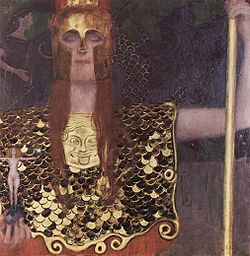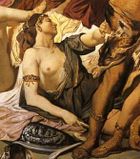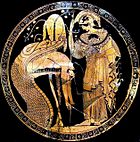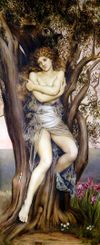Portal:Greek mythology
 Religion
Religion
Atheism- Creationism
- Mythology
- Nontheism
- Occult
- Spirituality
African (Serer) - Bábism (Bahá'í Faith)
-
 Buddhism (Mahayana
Buddhism (Mahayana - Tibetan
- Vajrayana)
- Chinese (Confucianism
- Falun Gong
- Taoism)
-
 Christianity (in China
Christianity (in China - in India)
- Seventh-day Adventism
- Anabaptism
 Anglicanism
Anglicanism- Arminianism
- Baptist
- Calvinism
- Christadelphianism
- Eastern (Oriental Orthodoxy
- Syriac)
- Latter Day Saints (Book of Mormon
- LDS Church
- Community of Christ)
- Lutheranism
- Methodism
- Roman Catholicism (Pope
- Bible
- Saints)
- Heathenism
- Hellenismos (Greek mythology)
- Indian (Ayyavazhi)
 Hinduism (mythology
Hinduism (mythology- Ravidassia)
- Jainism
- Sikhism
-
 Islam (in China
Islam (in China - in Russia
- Shia
- Ahmadiyya
- Sufism
- Quran)
- Judaism (Kabbalah)
-
 Scientology
Scientology - Shinto
- Wicca
- Zoroastrianism
|
Template:/box-header Greek mythology is the body of myths and legends belonging to the ancient Greeks concerning their gods and heroes, the nature of the world, and the origins and significance of their own cult and ritual practices. They are a part of religion in Greece. Modern scholars refer to the myths and study them in an attempt to throw light on the religious and political institutions of Ancient Greece, its civilization, and to gain understanding of the nature of myth-making itself. Greek mythology is embodied explicitly in a large collection of narratives and implicitly in representational arts, such as vase-paintings and votive gifts. Greek myth explains the origins of the world and details the lives and adventures of a wide variety of gods, goddesses, heroes, heroines, and other mythological creatures. These accounts initially were disseminated in an oral-poetic tradition; today the Greek myths are known primarily from Greek literature. The oldest known Greek literary sources, the epic poems Iliad and Odyssey, focus on events surrounding the Trojan War. Two poems by Homer's near contemporary Hesiod, the Theogony and the Works and Days, contain accounts of the genesis of the world, the succession of divine rulers, the succession of human ages, the origin of human woes, and the origin of sacrificial practices. Myths also are preserved in the Homeric Hymns, in fragments of epic poems of the Epic Cycle, in lyric poems, in the works of the tragedians of the fifth century BC, in writings of scholars and poets of the Hellenistic Age and in texts from the time of the Roman Empire by writers such as Plutarch and Pausanias. edit
Selected articleThe Amazons (Greek: Ἀμαζόνες, Amazónes, singular Ἀμαζών, Amazōn) are a nation of all-female warriors in Classical and Greek mythology. Herodotus placed them in a region bordering Scythia in Sarmatia (modern territory of Ukraine). Other historiographers place them in Asia Minor or Libya. Notable queens of the Amazons are Penthesilea, who participated in the Trojan War, and her sister Hippolyta, whose magical girdle was the object of one of the labours of Hercules. Amazonian raiders were often depicted in battle with Greek warriors in amazonomachies in classical art. The Amazons have become associated with various historical peoples throughout the Roman Empire period and Late Antiquity. In Roman historiography, there are various accounts of Amazon raids in Asia Minor. From the Early Modern period, their name has become a term for woman warriors in general. The origin of the word is uncertain. It may be derived from an Iranian ethnonym *ha-mazan-, "warriors", a word attested as a denominal verb (formed with the Indo-Iranian root kar- "make" also in kar-ma) in Hesychius of Alexandria's gloss ἁμαζακάραν· πολεμεῖν. Πέρσαι ("hamazakaran: 'to make war' (Persian)"). Alternatively, a Greek derivation from *ṇ-mṇ-gw-jon-es "manless, without husbands" (a- privative and a derivation of *man- also found in Slavic muzh) has been proposed. ...Archive — Nominations
edit
Gods and goddessesIn Greek mythology Demeter (/dəˈmiːtər/ də-MEE-tər; Greek: Δημήτηρ, Dēmētēr, probably "earth-mother") was the goddess of the harvest, who presided over grains, the fertility of the earth, the seasons (personified by the Hours), and the harvest. Though Demeter is often described simply as the goddess of the harvest, she presided also over the sanctity of marriage, the sacred law, and the cycle of life and death. She and her daughter Persephone were the central figures of the Eleusinian Mysteries that also predated the Olympian pantheon. Her Roman cognate is Ceres. According to the Athenian rhetorician Isocrates, the greatest gifts which Demeter gave were cereal (also known as corn in modern Britain), the cultivation of which made man different from wild animals; and the Mysteries which give the initiate higher hopes in this life and the afterlife. In the Homeric Hymn to Demeter, dated to about the seventh century BC. she is invoked as the "bringer of seasons", a subtle sign that she was worshipped long before she was made one of the Olympians. She and her daughter Persephone were the central figures of the Eleusinian Mysteries that also predated the Olympian pantheon. ...Archive — Nominations
edit
Selected picture Pallas Athena by Gustav Klimt. Athena, goddess of strength, is one of the twelve Olympians. ...Archive — Nominations
Template:/box-header Template:/Did you know Template:/box-footer edit
HeroesJason (Greek: Ἰάσων, Iásōn) was a late ancient Greek mythological hero, famous as the leader of the Argonauts and their quest for the Golden Fleece. He was the son of Aeson, the rightful king of Iolcus. He was married to the sorceress Medea. Jason appeared in various literature in the classical world of Greece and Rome, including the epic poem Argonautica and tragedian play, Medea. In the modern world, Jason has emerged as a character in various adaptations of his myths, such as the film Jason and the Argonauts. He has connections outside of the classical world, as he is seen as being the mythical founder of the city of Ljubljana, the capital of Slovenia. Pelias (Aeson's half-brother) was very power-hungry, and he wished to gain dominion over all of Thessaly. Pelias was the product of a union between their shared mother, Tyro and allegedly the sea god Poseidon. ...Archive — Nominations
edit
Legendary creaturesDryads (Δρυάδες, sing.: Δρυάς) are tree nymphs in Greek mythology. In Greek drys signifies 'oak,' from an Indo-European root *derew(o)- 'tree' or 'wood'. Thus dryads are specifically the nymphs of oak trees, though the term has come to be used for all tree nymphs in general. "Such deities are very much overshadowed by the divine figures defined through poetry and cult," Walter Burkert remarked of Greek nature deities. They were normally considered to be very shy creatures, except around the goddess Artemis, who was known to be a friend to most nymphs. The dryads of ash trees were called the Meliai. The ash-tree sisters tended the infant Zeus in Rhea's Cretan cave. Rhea gave birth to the Meliai after being made fertile by the blood of castrated Ouranos. Nymphs associated with apple trees were Epimeliad, and walnut-trees Caryatids. ...Archive — Nominations
Template:/box-header Template:/Topics Template:/box-footer The following Wikimedia sister projects provide more on this subject:
|


